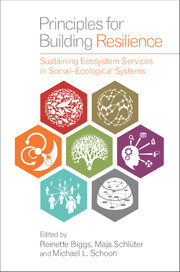Book contents
- Frontmatter
- Dedication
- Contents
- Acknowledgements
- Foreword
- List of contributors
- 1 An introduction to the resilience approach and principles to sustain ecosystem services in social–ecological systems
- 2 Politics and the resilience of ecosystem services
- 3 Principle 1 –Maintain diversity and redundancy
- 4 Principle 2 – Manage connectivity
- 5 Principle 3 –Manage slow variables and feedbacks
- 6 Principle 4 – Foster complex adaptive systems thinking
- 7 Principle 5 – Encourage learning
- 8 Principle 6 – Broaden participation
- 9 Principle 7 – Promote polycentric governance systems
- 10 Reflections on building resilience – interactions among principles and implications for governance
- Index
10 - Reflections on building resilience – interactions among principles and implications for governance
Published online by Cambridge University Press: 05 May 2015
- Frontmatter
- Dedication
- Contents
- Acknowledgements
- Foreword
- List of contributors
- 1 An introduction to the resilience approach and principles to sustain ecosystem services in social–ecological systems
- 2 Politics and the resilience of ecosystem services
- 3 Principle 1 –Maintain diversity and redundancy
- 4 Principle 2 – Manage connectivity
- 5 Principle 3 –Manage slow variables and feedbacks
- 6 Principle 4 – Foster complex adaptive systems thinking
- 7 Principle 5 – Encourage learning
- 8 Principle 6 – Broaden participation
- 9 Principle 7 – Promote polycentric governance systems
- 10 Reflections on building resilience – interactions among principles and implications for governance
- Index
Summary
SUMMARY
This book synthesizes and reviews the evidence in support of seven generic principles for enhancing the resilience of ecosystem services, i.e. the capacity of a social–ecological system to sustain a desired set of ecosystem services in the face of disturbance and ongoing change. Although some principles are better established than others, there is evidence that all are important. At the same time, none of the principles are universally beneficial, and all require a nuanced understanding of how, when and where they apply. Furthermore, the principles are often highly interdependent. Context matters and promoting the enhanced resilience of ecosystem services depends as much on how the individual principles are applied as on achieving an appropriate combination of principles. The nature of social–ecological systems as interdependent complex adaptive systems calls for governance and management that enhances aspects of a social–ecological system that help shape trajectories in desirable directions and enable adaptive responses to unexpected events. The principles are thus not final outcomes in themselves but rather features relevant for building resilience that should be considered when designing governance structures and management policies. More research is needed to better understand the individual principles, how they interact and how they can be operationalized and applied in different contexts.
INTRODUCTION
The degree to which humans are shaping ecosystems at local to global scales poses significant challenges in providing for the wellbeing of the planet's growing number of people (MA 2005; Martin 2007). One of the critical issues is ensuring the adequate and reliable provision of essential ecosystem services, such as freshwater, food and climate regulation, to meet the needs of society in a world that is expected to continue changing rapidly over the coming century. Social–ecological resilience is one growing body of research that seeks to provide insights and understanding to help address this challenge, premised on the assumption that the functioning of ecosystems and the provision of ecosystem services cannot be understood without accounting for the actions of people who live in these systems.
- Type
- Chapter
- Information
- Principles for Building ResilienceSustaining Ecosystem Services in Social-Ecological Systems, pp. 251 - 282Publisher: Cambridge University PressPrint publication year: 2015
- 4
- Cited by

